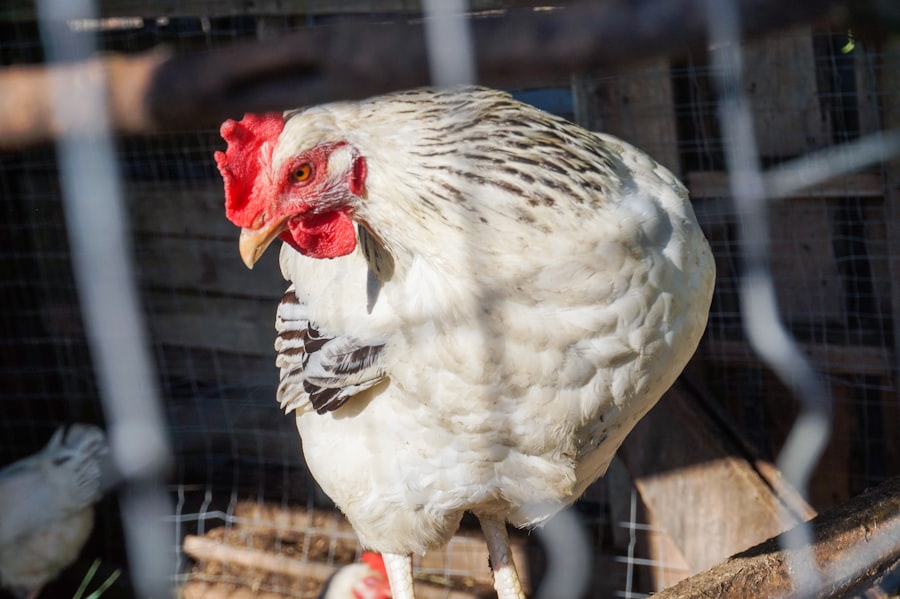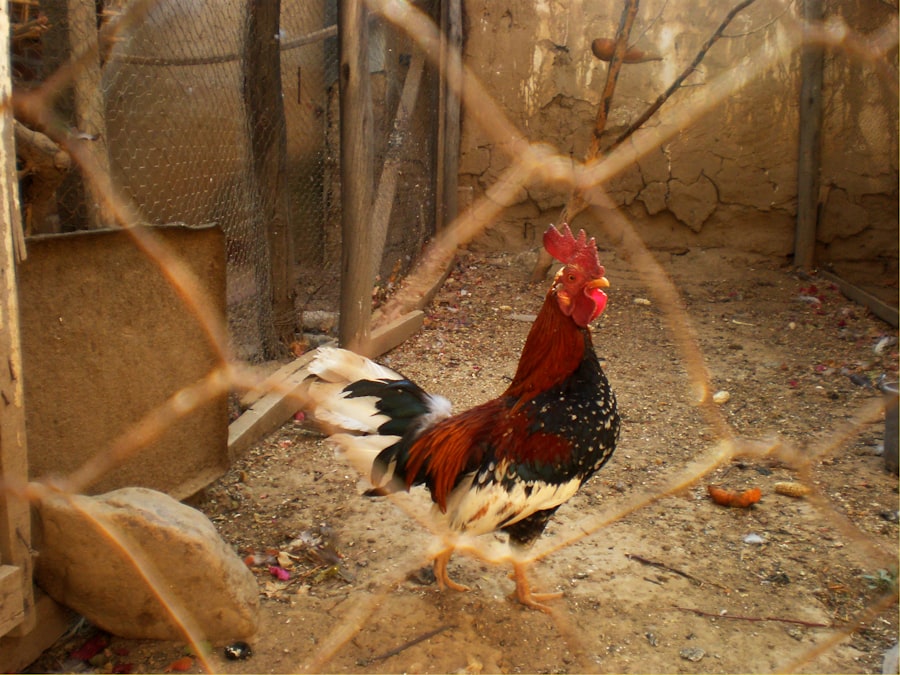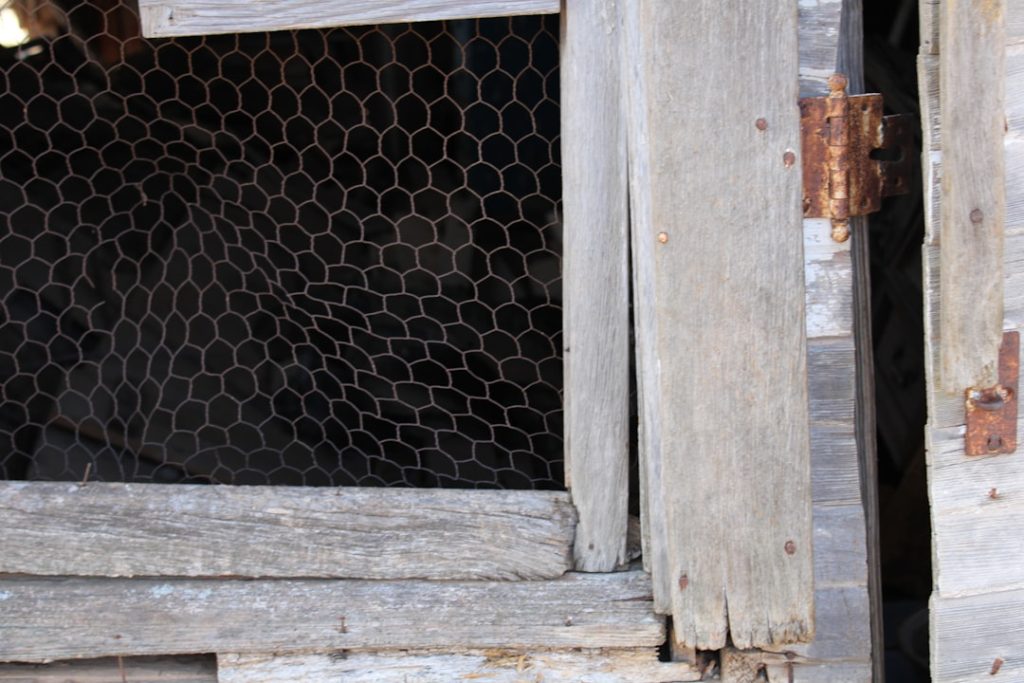Chickens perching on fences can be problematic for several reasons. These birds are naturally inquisitive and may be attracted to fences as they explore their surroundings. Fences also provide elevated positions for chickens to survey their environment and potentially avoid predators.
The warmth of sunlight on fences can be appealing to chickens, as they enjoy basking in sunny spots. Additionally, insects and small creatures near fences may attract chickens searching for food. Roosting behavior is another factor that may draw chickens to fences.
Chickens instinctively seek elevated perches for resting and sleeping, and fences can serve this purpose. Proximity to food and water sources, such as gardens or bird feeders, may also increase the likelihood of chickens frequenting fence areas. The presence of chickens on fences can lead to property damage and garden destruction.
Chickens may scratch and peck at plants, flowers, and vegetables, potentially reducing garden yields and damaging landscaping. Their droppings can create unsightly messes and may contain harmful bacteria, posing risks to humans and pets. Identifying the reasons for chickens’ attraction to fences is crucial in developing effective strategies to deter them and prevent their return.
Table of Contents
- 1 Creating Physical Barriers to Keep Chickens Off Your Fence
- 2 Utilizing Visual Deterrents to Keep Chickens Away
- 3 Implementing Scents and Tastes to Repel Chickens
- 4 Training Your Chickens to Stay Away from the Fence
- 5 Seeking Professional Help for Persistent Chicken Problems
- 6 Legal Considerations for Dealing with Neighbor’s Chickens on Your Fence
- 7 FAQs
Key Takeaways
- Chickens may be on your fence due to their natural instinct to perch and roost, as well as to seek out insects and food sources.
- Creating physical barriers such as wire mesh or netting can effectively keep chickens off your fence.
- Visual deterrents like scarecrows, reflective objects, or predator decoys can help deter chickens from perching on your fence.
- Implementing scents and tastes like citrus, vinegar, or hot pepper can repel chickens from your fence.
- Training your chickens to stay away from the fence can be achieved through positive reinforcement and consistent discipline.
- If you are unable to resolve persistent chicken problems on your own, seeking professional help from a pest control or animal control service may be necessary.
- Legal considerations for dealing with neighbor’s chickens on your fence may include checking local ordinances and consulting with your neighbor to find a mutually agreeable solution.
Creating Physical Barriers to Keep Chickens Off Your Fence
Physical Barriers: A Effective Deterrent
One effective way to keep chickens off your fence is to create physical barriers that prevent them from accessing it. One option is to install a chicken wire or mesh barrier along the top of the fence. This can be done by attaching the wire or mesh to the top of the fence using staples or zip ties. The barrier should extend outward at an angle to prevent the chickens from perching on the top of the fence.
Additional Barrier Options
Additionally, you can install a roof or canopy over the area where the chickens are accessing the fence to further deter them from roosting there. Another physical barrier option is to install a roller bar along the top of the fence. A roller bar is a cylindrical bar that spins when a chicken tries to land on it, making it difficult for them to balance and roost on the fence.
Combining Physical Barriers with Other Deterrents
In addition to these physical barriers, you can also consider installing a motion-activated sprinkler system near the fence. When the system detects movement, it will spray water, startling the chickens and discouraging them from approaching the area. You can also consider planting thorny or prickly bushes along the base of the fence. This can create an uncomfortable environment for chickens and deter them from approaching or perching on the fence.
Effective Prevention of Fence Access
By creating physical barriers to keep chickens off your fence, you can effectively prevent them from accessing your property and causing damage.
Utilizing Visual Deterrents to Keep Chickens Away

In addition to physical barriers, visual deterrents can also be effective in keeping chickens off your fence. One option is to install scarecrows or other visual deterrents near the fence. Scarecrows can be made from old clothes stuffed with straw or other materials and placed in strategic locations around your property.
The presence of these scarecrows can help deter chickens from approaching the fence by creating the illusion of a human presence. Another visual deterrent option is to use reflective objects such as CDs or mirrors near the fence. When light hits these reflective surfaces, it creates flashes and glares that can startle and deter chickens from approaching the area.
Additionally, you can consider hanging shiny streamers or ribbons near the fence to create movement and noise that can help deter chickens. Another effective visual deterrent is to use predator decoys near the fence. Predator decoys such as fake owls or hawks can create the illusion of a threat to chickens and discourage them from approaching the area.
These decoys should be moved regularly to maintain their effectiveness and prevent chickens from becoming accustomed to their presence. In addition to these visual deterrents, you can also consider using motion-activated lights or sound devices near the fence. When these devices detect movement, they will activate lights or emit sounds that can startle and deter chickens from approaching the area.
By utilizing visual deterrents, you can effectively keep chickens away from your fence and protect your property.
Implementing Scents and Tastes to Repel Chickens
Another effective way to keep chickens off your fence is to implement scents and tastes that are unappealing to them. One option is to use natural repellents such as citrus peels or essential oils near the fence. Chickens are known to dislike the smell of citrus, so placing citrus peels or spraying citrus-scented essential oils near the fence can help deter them from approaching the area.
Another natural repellent option is to use strong-smelling herbs such as mint, lavender, or rosemary near the fence. These herbs emit strong scents that chickens find unpleasant, making them effective deterrents for keeping chickens away from your property. In addition to scents, you can also consider using taste deterrents such as hot pepper spray near the fence.
Hot pepper spray can be made by mixing water with hot pepper flakes or hot sauce and spraying it near the fence. Chickens have a strong sense of taste and will avoid areas that have a spicy or unpleasant flavor. Another taste deterrent option is to sprinkle cayenne pepper or garlic powder near the base of the fence.
Chickens will avoid areas with these strong flavors, making them effective deterrents for keeping chickens off your fence. By implementing scents and tastes that are unappealing to chickens, you can effectively deter them from approaching and perching on your fence. These natural repellents are safe for both chickens and the environment, making them an ideal solution for keeping chickens away from your property.
Training Your Chickens to Stay Away from the Fence
If you own chickens and they are constantly perching on your fence, it’s important to train them to stay away from the area. One effective training method is to use positive reinforcement when chickens stay away from the fence. You can reward them with treats or praise when they stay on the ground and away from the fence, reinforcing this behavior and encouraging them to continue staying away from the area.
Another training method is to use negative reinforcement when chickens approach or perch on the fence. You can use a gentle spray of water or a noise-making device when chickens approach the fence, creating a negative association with the behavior and discouraging them from repeating it in the future. Additionally, you can consider providing alternative perching spots for your chickens away from the fence.
By providing elevated perches or roosting areas in other parts of your property, you can encourage your chickens to stay away from the fence and use these designated areas instead. Consistency is key when training your chickens to stay away from the fence. It’s important to be patient and persistent with your training efforts, as it may take time for your chickens to learn and adapt their behavior.
By training your chickens to stay away from the fence, you can effectively prevent them from causing damage to your property and keep them safe from potential harm.
Seeking Professional Help for Persistent Chicken Problems

Expert Insight and Solutions
A professional animal behaviorist or chicken expert can provide valuable insight into why chickens are attracted to your fence and offer effective solutions for keeping them away. Additionally, a professional pest control service can help assess the situation and provide targeted solutions for deterring chickens from accessing your property.
Customized Solutions for Your Property
They may recommend specific physical barriers, visual deterrents, or natural repellents that are tailored to your specific situation and property layout.
Resolving Disputes with Neighbors
Furthermore, if you are dealing with persistent chicken problems caused by your neighbor’s chickens, it may be necessary to involve local authorities or animal control services. They can help mediate disputes between neighbors and enforce local ordinances or regulations regarding free-roaming animals.
By seeking professional help for persistent chicken problems, you can gain valuable expertise and support in finding effective solutions for keeping chickens off your fence and protecting your property.
Legal Considerations for Dealing with Neighbor’s Chickens on Your Fence
If you are dealing with neighbor’s chickens on your fence, it’s important to consider legal considerations when addressing the issue. Firstly, it’s important to review local ordinances and regulations regarding free-roaming animals in your area. Some areas may have specific laws that govern where chickens are allowed to roam and how they should be contained on private property.
If neighbor’s chickens are consistently accessing your property and causing damage, it may be necessary to have a conversation with your neighbor about the issue. Open communication and collaboration with your neighbor can help find a mutually beneficial solution for keeping their chickens away from your property. If open communication with your neighbor does not resolve the issue, it may be necessary to involve local authorities or animal control services.
They can help mediate disputes between neighbors and enforce local ordinances or regulations regarding free-roaming animals. Additionally, if neighbor’s chickens are causing significant damage to your property or posing a threat to your safety, it may be necessary to seek legal counsel for further assistance in addressing the issue. By considering legal considerations for dealing with neighbor’s chickens on your fence, you can navigate the situation effectively and find a resolution that protects your property and maintains positive relationships with your neighbors.
In conclusion, dealing with chickens on your fence can be a challenging issue that requires careful consideration and effective solutions. By understanding why chickens are attracted to your fence and implementing physical barriers, visual deterrents, scents and tastes, training methods, seeking professional help, and considering legal considerations when dealing with neighbor’s chickens on your fence, you can effectively address the issue and prevent further damage to your property. With patience, persistence, and proactive measures, you can keep chickens away from your fence and create a safe and harmonious environment for both you and your feathered neighbors.
If you’re looking for a solution to keep chickens off your fence, you might want to consider building an A-frame chicken coop. This type of coop not only provides a safe and comfortable space for your chickens, but it also keeps them contained and away from your fence. Check out this article on poultrywizard.com for more information on how to build and use an A-frame chicken coop to keep your chickens from wandering onto your fence.
FAQs
What are some methods to keep chickens off my fence?
Some methods to keep chickens off your fence include installing a physical barrier such as a chicken wire or netting, using deterrents such as motion-activated sprinklers or noise-making devices, and training the chickens to stay away from the fence through positive reinforcement.
Why is it important to keep chickens off my fence?
Keeping chickens off your fence is important to prevent damage to the fence, protect your garden or property from being accessed by the chickens, and to maintain a clean and organized outdoor space.
Are there any natural deterrents to keep chickens off my fence?
Some natural deterrents to keep chickens off your fence include planting thorny bushes or shrubs near the fence, using citrus peels or vinegar as a spray on the fence, and creating a barrier with rocks or gravel that chickens do not like to walk on.
What are the potential risks of having chickens on my fence?
Having chickens on your fence can lead to damage to the fence such as scratching and pecking, potential spread of diseases or parasites, and access to areas of your property that you may want to keep off-limits to the chickens.
How can I train my chickens to stay off my fence?
You can train your chickens to stay off your fence by using positive reinforcement such as providing treats or rewards for staying away from the fence, creating designated areas for the chickens to roam and explore, and consistently redirecting the chickens away from the fence when they approach it.
Meet Walter, the feathered-friend fanatic of Florida! Nestled in the sunshine state, Walter struts through life with his feathered companions, clucking his way to happiness. With a coop that’s fancier than a five-star hotel, he’s the Don Juan of the chicken world. When he’s not teaching his hens to do the cha-cha, you’ll find him in a heated debate with his prized rooster, Sir Clucks-a-Lot. Walter’s poultry passion is no yolk; he’s the sunny-side-up guy you never knew you needed in your flock of friends!







